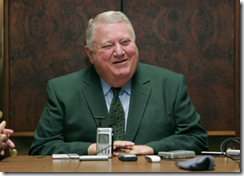 Just hours before Alabama was set to meet Penn State in a Happy Valley clash of the titans, Crimson Tide media relations released a statement explaining that WR Duron Carter would not be playing and indeed, had not made the trip from Tuscaloosa.
Just hours before Alabama was set to meet Penn State in a Happy Valley clash of the titans, Crimson Tide media relations released a statement explaining that WR Duron Carter would not be playing and indeed, had not made the trip from Tuscaloosa.
"Wide receiver Duron Carter did not travel with the football team to State College for today's game. The University of Alabama is awaiting documents necessary for Duron to be certified. Until those documents are received, Duron may continue practicing with the team, but he cannot compete in a game."
While the school has released few details on the issues preventing Carter from joining the team on the field, indications are that there remains an outstanding dispute between the Junior College transfer and his former school, Coffeyville Community College in Kansas. Carter had transferred there from Ohio State and is the son of former NFL player and ESPN analyst Cris Carter. The younger Carter is a gifted athlete with many of his father’s talents and, if he gets the chance to play, is expected to make an immediate impact for Nick Saban’s Crimson Tide.
Alabama covets a “go to” receiver to replace Julio Jones, the Atlanta Falcon’s first round draft pick who led the team last year with 78 catches for 1133 yards. The temptation to dress Carter and get him on the field is strong and had this situation come up 5-10 years ago, it might have been too much to resist. The temptation might have led to shortcuts being taken to get an impact player on the field despite potentially serious eligibility issues.
Not with this staff.
Students transferring from other institutions and junior colleges must wade through a complicated, bureaucratically SNAFU-ed process of documentation of verifying transcripts and establishing enrollment eligibility. Add the navigation of the NCAA’s rulebook and it gets even more interesting. The Alabama compliance department is working with admissions and making sure every “i” is dotted and every “t” is crossed in Carter’s transfer status and until everything is clear, Carter may not play in a game. That’s the way it’s supposed to be done but in today’s “hot story” news environment, nobody notices when things are done right.
There are other players on the current roster who have been the subject of NCAA compliance matters affecting their eligibility as well. Russellville standout Brent Calloway ran into a snag verifying a summer school class that he needed to establish initial eligibility, and WR Darius Hanks was made to sit two games for playing in a game during a season he was eventually redshirted in. Those are two more examples of Alabama compliance getting it right and keeping the kids and the athletic department out of the NCAA doghouse.
Can you name an NCAA major infractions case in the last 5-10 years where the violations weren’t known by the school or the public until someone in the media published the results of an investigation into the institution’s activities? There’s only one that I can think of—the Alabama textbook case, discovered by UA officials in 2007, investigated by the compliance staff and self-reported to the NCAA. Granted, that case resulted in probation and vacation of wins, but consider this: As bitter as the medicine was, the University of Alabama handled the case properly and took the medicine anyway.
 This was all going down at about the same time that Alabama compliance staff successfully derailed Operation Red Dog, a coordinated and organized attempt by Auburn fans to entrap Alabama football players and lure them into committing NCAA violations.
This was all going down at about the same time that Alabama compliance staff successfully derailed Operation Red Dog, a coordinated and organized attempt by Auburn fans to entrap Alabama football players and lure them into committing NCAA violations.
Contrast this situation with the one at Ohio State, where the school was blindsided by a report in the school’s own student newspaper, which was then picked up and expanded upon by local, then national media. The case included a drug dealing, tattoo shop owner trading cash, tattoos and other favors for sports memorabilia and equipment from football players. It also included a violation of NCAA ethics bylaws by the head football coach, who concealed knowledge of the impermissible benefits and ended up losing his job.
 Compare it also with the absolutely toxic revelations detailed in Yahoo! Sports’ Charles Robinson’s expose of the University of Miami program. Robinson chronicled how a convicted Ponzi scheme architect doled out hundreds of thousands of dollars in cash and hired prostitutes for Hurricanes football players for nearly a decade. Ironically, almost all of Nevin Shapiro’s “Lil Luke” activities went on right under the nose—and perhaps even with the knowledge of—its former Athletic Director Paul Dee. The same Paul Dee who sat on the Committee on Infractions that heard the Means case in 2001-02 and chaired the Committee that heard and decided the textbook case. You won’t find any louder proponent for doing away with that Committee’s discretion than this blog, but that’s a discussion for another day.
Compare it also with the absolutely toxic revelations detailed in Yahoo! Sports’ Charles Robinson’s expose of the University of Miami program. Robinson chronicled how a convicted Ponzi scheme architect doled out hundreds of thousands of dollars in cash and hired prostitutes for Hurricanes football players for nearly a decade. Ironically, almost all of Nevin Shapiro’s “Lil Luke” activities went on right under the nose—and perhaps even with the knowledge of—its former Athletic Director Paul Dee. The same Paul Dee who sat on the Committee on Infractions that heard the Means case in 2001-02 and chaired the Committee that heard and decided the textbook case. You won’t find any louder proponent for doing away with that Committee’s discretion than this blog, but that’s a discussion for another day.
Immediately after the NCAA’s decision on the textbook case, ESPN Senior College Football Writer Ivan Maisel had the following:
Coach Dennis Franchione, who had been at Alabama for little more than a year, said he felt blindsided [by the Means case decision]. The tangible loss of scholarships took its toll on the football team. Franchione stayed one more season. Then came the five-month stint of Mike Price and the four-year slog of Mike Shula.
Football mediocrity, together with the intangible stain of being a two-time NCAA loser, took its toll on Alabama officials. They got it.
In the brief statement that he read to the media Thursday afternoon, athletic director Mal Moore said that Alabama "conducted an exhaustive review."
He added, "We have clearly demonstrated our intent to do things the right way."
…
The penalties apply backward, not forward. Alabama must vacate 21 football victories. But that's about it. Where these textbooks are concerned, the NCAA made a molehill out of a molehill. Alabama accepted responsibility, performed its due diligence and fixed the flaw.
In other words, in its dealings with the NCAA, the university finally found a textbook solution.
And that “textbook” solution carries forward to this day—doing compliance right means Duron Carter sits until he is eligible. It means Darius Hanks trades two games for one, consistent with NCAA eligibility rules. It means Brent Calloway is eligible to practice and play with the team.
And it means that a ZOMG bunch of facebook pictures and gossip blog posts hang on rival fans like so many cheap suits.

0 comments :
Post a Comment
You must have a Google Account to post a comment.
WARNING: Posting on this blog is a privilege. You have no First Amendment rights here. I am the sole, supreme and benevolent dictator. This blog commenting system also has a patented Dumbass Detector. Don't set it off.